“I have a few minutes,” he said. “Perhaps the only ones for the rest of this day. Would you like to sit for a time?”
“Of course,” I said.
He led me across the room and into a cluster of modern overstuffed reading chairs before the bay window. Beyond were a hundred yards of dense, manicured grass. Very simple. No garden. A fieldstone path to a waist-high stone fence. I wondered if that was where Lady Stockman went over.
Beyond the fence lay the wide stretch of the Strait of Dover, its surface gray starting to mitigate, becoming the vague blue of slate now, as the clouds were beginning to break.
Stockman pointed to one of the wingback reading chairs. I sat.
He didn’t. “Brandy all right?” Stockman asked.
“Of course,” I said. “Thanks.”
He went to a drinks table beneath the apron of the far right segment of the bay window. That part was a casement, I could see. And the baronet himself poured us snifters and carried them over. He sat in the companion chair — the two were at a slight angle toward each other — and he handed me a snifter.
“A fine Armagnac,” he said. “I prefer it.” Meaning, I presumed, to the more popular Cognac.
“To Armagnac,” I said, lifting the snifter in a toast.
We touched glasses.
The brandy was a deep red sunset on the tongue and a noonday sun going down.
“You do understand German quite well,” Stockman said.
“We spoke it in the family,” I said. “I had sense enough to keep it up afterwards.”
He said, “You understand, of course, that I am thoroughly British.”
“I understand,” I said.
“But I find that compatible with a regard for Germany and a regret over this animosity that has sprung up between us.”
“The English are Germans,” I said.
“Just so.”
“Strictly speaking,” I said, “the United States is not yet allied to one side or the other, but I feel the same tension at home.”
“I do love my country,” he said.
He had turned his face to the window. No eye contact. He allowed the ambiguity but would not overtly share it: which country was that?
As frank as he’d become with me, it sounded as if this was as far as he would go. He might well have decided I was no threat and, indeed, a friend of Germany. The declaration of his Britishness and the rhetoric suggesting a compatible Germany and the wrongness of the war were undoubtedly risky for a Brit, given the anti-German war fervor felt by most of his countrymen. But this was no doubt a position quietly kept by a number of other Englishmen, who nevertheless remained loyal by the light of a democracy’s highest belief in the freedom of thought. He didn’t have to be an active German agent to be talking like this.
He intended to show me no more.
I thought: He has just run an automobile-size Union Jack up a castle-roof flagpole.
Which led me to gently prod him. “That enormous flag above us,” I said, “flying over a British castle on the way to the mouth of the Thames. Isn’t it a sharp stick in the eye of a Zeppelin commander, daring him to drop his first bomb here?”
“Their realm is the night,” he said. I knew the answer, of course, that the flag was invisible when the Zeppelins typically came. But it was the hint of a hush, the tinge of a tremor in his voice over this subject that I’d wanted to evoke and listen to. Just for starters. And all of that was clearly there in his voice. A good actor would kill to render that vocal nuance at will.
“They are impressive, aren’t they,” I said.
“They are the future,” Stockman said.
I said, “The Londoners stiffen their upper lips and elevate their bravado, but I think the Zepps unsettle them.”
“Terrify them.” Stockman inflated the verb I’d deliberately diminished. Intensely so.
“The airship war is getting stronger,” I said.
He drained the rest of his Armagnac.
He was saying no more.
I thought to press on. To probe his feelings about the poison gas attack at the Second Battle of Ypres, about the lesson felt in London and Washington and Paris and Berlin from that battle: the Allies still weren’t ready to effectively fight a war. And it wasn’t just about the gas. Or a shortage of artillery shells. Kitchener was struggling to properly train his million promised troops. The Anglo-French army had no near prospects of breaking the German line. Germany was growing fearless. And the Zepps would soon rule the night.
I wanted to work Stockman up, now that he was comfortable with me. But my credentials with him were too fresh. I risked undoing them if he sensed I was baiting him.
He stood up, moved away. The bottles rattled at the drink table. “Would you like a refill?” he asked.
“No, thanks,” I said.
He returned with a renewed snifter and sat.
He drank. He said, “What do you know about Isabel Cobb?”
I hid in a sip of my brandy. I could easily have seen this as ominous. I’d tried to finesse him into showing me signs of his allegiance to Germany in a weapons-and-havoc way. He could well be doing likewise, looking for a conspiratorial connection between me and this woman he was wooing.
“What sort of thing?” I said.
“I’m interested in her background. You’re writing about her. Something I might not know.”
It was one of the Kaiser’s own precious Prussians who formulated “the best defense is a good offense.” So I said, “Since you read American newspapers, you may have seen a Cobb byline. Christopher Cobb. It’s not well known, but that’s Isabel’s son. They broke off contact more than a decade ago, as I understand it.”
I watched Stockman’s face. It didn’t register much of anything. Old news, maybe. “I’ve heard about him,” he said. Nothing more. No follow-up question. He was simply waiting for something he didn’t know.
Okay, I thought. Maybe it actually was my mother he was assessing now. As a potential spy. Or a potential lover.
“I didn’t realize this till recently,” I said. “She sings.”
“She’s singing tonight,” Stockman said.
“Sorry. I haven’t been working the story for very long.”
Stockman stirred in his seat. Sipped. Looked out to the late afternoon sky, which was brightening.
He did indeed want to know about her men, I thought.
I drained my Armagnac. I wished I had another. I’d slug it down quick. But for what we needed to accomplish, my mother and I, Stockman had to stay interested, and this opportunity would not last.
I lowered my voice. “Man to man?” I said.
“Yes,” he said, keeping his eyes out the bay window.
“From what I can gather she has no. . affiliations.”
He turned his eyes to me. Me, who had become his mother’s pimp. In service to their country.
His look was man to man. He was grateful for the news.
Then he glanced away, toward the library door, responding to a cue that I had missed.
I looked too.
Martin was standing there, changed from his chauffeur livery into a two-piece gray suit.
“I’m afraid it’s time to attend to my beloved constituents,” Stockman said.
He rose. I began to rise as well, but he stopped me with the flash of his right palm. “Enjoy the books,” he said.
I sat back down.
“Help yourself to the brandy,” he said, and he turned abruptly and strode across the library floor. He reached the door and paused, speaking a few words to Martin, whose eyes slid briefly to mine as he listened.
Either I’d passed all my tests, as I’d thought, and he was telling his tough guy I was okay, or I was dead wrong and he was issuing a warning. Or a nasty instruction.
But as Stockman pushed past, Martin lingered for one small moment and looked to me, seeing that I’d been watching, and he gave me a slight nod. I nodded back.
Читать дальше












